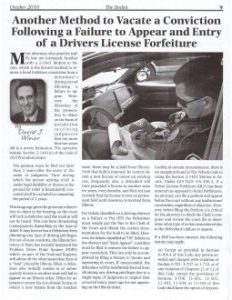Vacate Conviction in Court
 Another Method to Vacate a Conviction Following a Failure to Appear and Entry of a Drivers License Forfeiture by David Winer
Another Method to Vacate a Conviction Following a Failure to Appear and Entry of a Drivers License Forfeiture by David Winer
Most attorneys who practice traffic law are intimately familiar with a 2-1401 Motion to Vacate which is the favored method to remove a Bond Forfeiture conviction from a Defendant’s driving record following a failure to appear. However, the discretion of the prosecution to object on the basis of jurisdiction involving judgments that are more that two years old is a severe limitation. The operative statute 735 ILCS 5/2-1401, in section (c) in the Code of Civil Procedure states:
(c)……… The petition must be filed not later than 2 years after the entry of the order or judgment. Time during which the person seeking relief is under legal disability or duress or the ground for relief is fraudulently concealed shall be excluded in computing the period of 2 years.”
This language gives the prosecutor discretion to object and therefore the court will lack jurisdiction and the motion will not be heard. This can have devastating consequences and depending on the type of ticket it can forever bar a Defendant from obtaining any type of driving privileges. For out of state residents the Secretary of State has recently instituted the Problem Driver Point System (PDPS) which, as part of the National Registry, will advise all the other states that there is a “Hold” placed by Illinois. Often a Defendant who initially resides in or subsequently moves to another state will fail to appear on an Illinois ticket. When he attempts to renew his out of state license or obtain new license from the resident state there may be a hold from Illinois. Until that hold is removed he cannot obtain a new license or renew an existing one. Often, a Defendant will have possessed a license in another state for years, even decades, and find out just recently that his license is now on permanent hold unit clearance is received from Illinois. For tickets classified on a driving abstract as a Failure to Pay (FP) the Defendant must simply pay the fine to the Clerk of the Court and obtain the correct documentation and the hold will be lifted. However, for tickets classified as “08” tickets and “Must Appear” a petition must be filed to remove the failure to appear conviction which can only be accomplished by filing a Motin to Vacate and appearing in court. If unsuccessful, the Defendant will be indefinitely barred from obtaining any driving privileges due to a single lapse of judgment or neglect that occurred many years ago for not appearing on the Illinois ticket.
However, in certain circumstances there is an exception to using the 2-1401 Motion to Vacate. Under 625 ILCS 5/6-306.3, if a Driver License Forfeiture (DLF) has been entered, as opposed to Bond Forfeiture, an attorney can file a petition and appear before the court without any objection or jurdisctional constraints. However, before filing the Petition it is critical for the attorney to check the Clerk’s computer and review the court file to determine what type of action was entered due to the Defendant’s failure to appear. If a DLF has been entered the below statute may apply:
(a) Except as provided in Section 6 306.4 of this Code, any person arrested and charged with violation of Section 3 701, 3 707, or 3 710, or of any violation of Chapters 11 or 12 of this Code, except the provisions of Sections 3 708, 11 401, 11 501, 11 503, 11 504, or 11 506 of this Code shall have the option of depositing his valid driver’s license issued under this Code with the officer demanding bail in lieu of any other security for his appearance in court in answer to any such charge.
(b) However, a uniform bail schedule and regulations adopted pursuant to Supreme Court Rule or Order may require that a driver’s license issued under this Code must be deposited, in addition to appropriate cash deposit, where persons arrested and charged with violating Sections 3 708, 11 401, 11 501, 11 503, 11 504, or 11 506 of this Code elect to take advantage of the uniform schedule establishing the amount of bail in such cases.
(c) When a license is deposited as security in lieu of or in addition to bail, the judge, court clerk, or other official accepting such deposit shall issue to the licensee a receipt for such license upon a form approved or provided by the Secretary of State.
(d) If the licensee whose license has been deposited as security for bail does not appear in court in compliance with the time and place for hearing as notified in such receipt, or the continued date thereof, if any has been ordered by the court, the court shall continue the case for a minimum of 30 days and require a notice of the continued court date be sent to the licensee at his last known address. The clerk of such court shall notify the licensee of the court’s order. If the licensee does not appear in and surrender on the continued court date, or within such period, satisfy the court that his appearance in and surrender to the court is impossible and without any fault on his part, the court shall enter an order of failure to appear to answer such charge after depositing license in lieu of bail. The clerk of such court shall notify the Secretary of State of the court’s order.
The Secretary of State, when notified by the clerk of such court that an order of failure to appear to answer such charge after depositing license in lieu of bail has been entered, shall immediately suspend the driver’s license of such licensee without a hearing and shall not remove such suspension, nor issue any hardship license or privilege to such licensee thereafter until notified by such court that the licensee has appeared and answered the charges placed against him.
(e) 1. Any Illinois resident who has executed a written promise to comply with Section 6 306.2 of this Code, in effect until July 28, 1986, shall continue to be suspended until he or she complies with the terms and conditions of the written promise.
2. The Secretary of State, when notified by the clerk of such court that an order of failure to appear to answer a charge after promising to appear has been entered, shall immediately suspend the driver’s license of such licensee without a hearing and shall not remove such suspension, nor issue a hardship license or privilege to such licensee thereafter until notified by such court that the licensee has appeared and answered the charges placed against him. 725 ILCS 6 306.3, P.A. 95-310, eff 1-1-08 (emphasis added)
Unlike 2-1401 which has a two year limitation, the last sentence of Section 2 of 6-306.3 permits the Defendant to appear and answer the charges placed against him without any jurisdictional constraint. The case can be simply motioned back into court and by having “appeared and answered to the charges placed against him” a Defendant can have the Failure to Appear removed, the “08” suspension lifted and Illinois hold removed. Of course, following a negotiated plea or trial, if there are any fines or other penalties ordered after the motion has been heard the Defendant must comply with the court’s order.
If successful, in order to expedite the removal of the Illinois hold it is advisable to obtain a certified Court Disposition, Notice of Compliance and payment receipt from the Court Clerk and send it to the Secretary of State in Springfield or have it hand delivered to their Chicago office. If the Defendant lives out of state he should also be provided with certified copies to provide to their Department of Motor Vehicles. Once the Failure to Appear conviction has been removed a Defendant can obtain driving privileges in Illinois or removal of the Illinois and obtain a new driver’s license in his resident state.
David J. Winer concentrates in Criminal, DUI/ Traffic and Secretary of State defense and practices with the Law Office of Winer & Winer in Waukegan.
